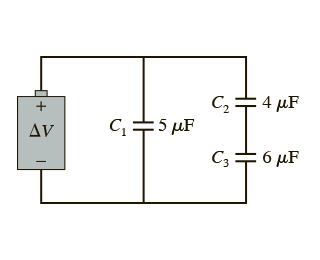Capacitors and Potential Difference

If delta V=6.0V, what is the charge on each capacitor.
I am under the impression that the delta V of each individual capacitor must be different to that of the battery, but I am not sure which formulas would be most useful in determining this.
Original post by PatchworkTeapot
If delta V=6.0V, what is the charge on each capacitor.
I am under the impression that the delta V of each individual capacitor must be different to that of the battery, but I am not sure which formulas would be most useful in determining this.

If delta V=6.0V, what is the charge on each capacitor.
I am under the impression that the delta V of each individual capacitor must be different to that of the battery, but I am not sure which formulas would be most useful in determining this.
The charge on C1 is unaffected by the charge on C2 and C3.
Work out the series combination capacitance for C2 and C3 and then find the charge for that equivalent series capacitance.
Substitute that charge value back into the V=Q/C equation for each value of C2 and C3 to find the p.d. developed across each.
(edited 8 years ago)
C for the series of 2 and 3 would work out to 2.4, based on (1/C2+1/C3)^-1.
What would you do after this to figure out the charge?
What would you do after this to figure out the charge?
Original post by PatchworkTeapot
C for the series of 2 and 3 would work out to 2.4, based on (1/C2+1/C3)^-1.
What would you do after this to figure out the charge?
What would you do after this to figure out the charge?
The total voltage of 6V must be shared in the ratio of the series capacitances.
Hence for C2:
NB the exponents cancel out.
Then the charge on C1 is found using:
You can do the rest.

Quick Reply
Related discussions
- Confusing Capacitor question
- A level physics capacitors
- OCR A Physics 2018 paper 2 capacitors
- Capacitor Question (PHYS)
- Electric eqs q
- Impedance
- Hypothesis Testing
- Unit 1 engineering design for hnc... Ideas
- AQA A Level Physics Paper 2 7408/2 - 10 Jun 2022 [Exam Chat]
- Hnc electrical engineering maths question
- Engineering maths help
- A level physics question Capacitance (2)
- HNC electrical engineering maths question
- need help please!
- Capacitors
- Capacitance
- Physics Question help
- hypothesis Testing with only > Mean side of z table
- Hard Capacitor Question AQA A Level Physics
- Physics OCR A-level PAG 9.2




